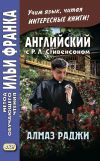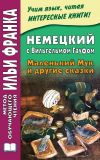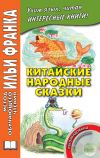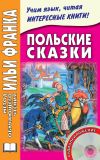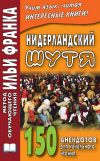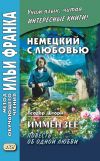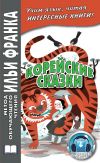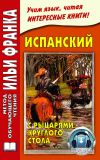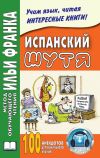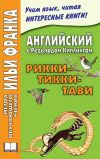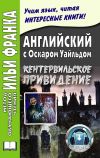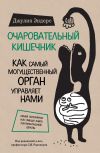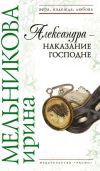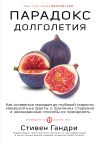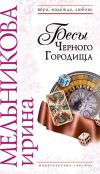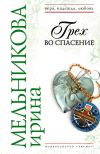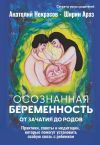
Автор книги: Энтони Хоуп
Жанр: Иностранные языки, Наука и Образование
Возрастные ограничения: 16+
сообщить о неприемлемом содержимом
I knew what she meant, and a shiver ran through me (я знал, что она имеет в виду, и дрожь прошла у меня /по телу/: «и меня пронзила дрожь»; to know; to run). But I could not utterly fail her (но я не мог совсем подвести ее). I rose and took her hand (я встал и взял ее за руку; to rise; to take).

“I know people write and talk as if it were. Perhaps, for some, Fate lets it be. Ah, if I were one of them! But if love had been the only thing, you would have let the King die in his cell.”
I kissed her hand.
“Honour binds a woman too, Rudolf. My honour lies in being true to my country and my House. I don’t know why God has let me love you; but I know that I must stay.”
Still I said nothing; and she, pausing a while, then went on:
“Your ring will always be on my finger, your heart in my heart, the touch of your lips on mine. But you must go and I must stay. Perhaps I must do what it kills me to think of doing.”
I knew what she meant, and a shiver ran through me. But I could not utterly fail her. I rose and took her hand.
“Do what you will, or what you must (поступай так, как хочешь, или как должна),” I said. “I think God shows His purposes to such as you (думаю, Господь открывает Свою волю таким, как ты; purpose – намерение, цель; воля, целеустремленность). My part is lighter (моя роль скромнее: «легче»); for your ring shall be on my finger and your heart in mine (твой перстень /всегда/ будет на моем пальце, а твое сердце – в моем), and no touch save of your lips will ever be on mine (и никогда ничьи губы, кроме твоих, не коснутся меня). So, may God comfort you, my darling (да /пошлет/ Господь тебе утешение, любимая)!”
There struck on our ears the sound of singing (звуки пения донеслись до наших ушей: «звук пения ударил нам в уши»; to strike). The priests in the chapel were singing masses (священники в часовне служили: «пели» панихиды; mass – месса, литургия) for the souls of those who lay dead (по душам тех, что лежали мертвыми; to lie). They seemed to chant a requiem over our buried joy (казалось, они пели реквием по нашему похороненному счастью), to pray forgiveness for our love that would not die (и молили о прощении для нашей любви, которая не желала умирать). The soft, sweet, pitiful music rose and fell (спокойная, мелодичная, жалостливая = печальная музыка звучала то громче, то тише: «поднималась и падала») as we stood opposite one another, her hands in mine (когда мы стояли друг напротив друга, и я /держал/ ее за руки).
“My queen and my beauty (моя королева, моя красавица)!” said I.
“My lover and true knight (мой возлюбленный и истинный рыцарь)!” she said. “Perhaps we shall never see one another again (возможно, мы никогда снова не увидим друг друга). Kiss me, my dear, and go (поцелуй меня, мой дорогой, и иди)!”
I kissed her as she bade me (я поцеловал ее, как она просила); but at the last she clung to me, whispering nothing but my name (но в последнюю /минуту/ она прильнула ко мне, шепча только мое имя), and that over and over again – and again – and again; and then I left her (и так снова и снова; а потом я оставил ее).

“Do what you will, or what you must,” I said. “I think God shows His purposes to such as you. My part is lighter; for your ring shall be on my finger and your heart in mine, and no touch save of your lips will ever be on mine. So, may God comfort you, my darling!”
There struck on our ears the sound of singing. The priests in the chapel were singing masses for the souls of those who lay dead. They seemed to chant a requiem over our buried joy, to pray forgiveness for our love that would not die. The soft, sweet, pitiful music rose and fell as we stood opposite one another, her hands in mine.
“My queen and my beauty!” said I.
“My lover and true knight!” she said. “Perhaps we shall never see one another again. Kiss me, my dear, and go!”
I kissed her as she bade me; but at the last she clung to me, whispering nothing but my name, and that over and over again – and again – and again; and then I left her.
Rapidly I walked down to the bridge (я быстро спустился к мосту). Sapt and Fritz were waiting for me (Сэпт с Фрицем ждали меня). Under their directions I changed my dress (под их руководством = повинуясь их указаниям, я переоделся: «переменил одежду»), and muffling my face, as I had done more than once before (и, закутав лицо, как я делал прежде не один раз), I mounted with them at the door of the Castle (сел, как и они, на коня у ворот замка), and we three rode through the night and on to the breaking day (и мы втроем проскакали всю ночь до рассвета), and found ourselves at a little roadside station just over the border of Ruritania (пока не очутились на маленькой железнодорожной станции сразу за границей Руритании; roadside – придорожный; road – дорога, путь, шоссе; железная дорога /амер./). The train was not quite due (поезд немного опаздывал: «поезд был не совсем точным»; due – должный, надлежащий; ожидаемый; /нареч./ точно), and I walked with them in a meadow by a little brook (и я прогуливался с ними по лугу вдоль небольшого ручейка) while we waited for it (пока мы ждали его /прибытия/). They promised to send me all news (они пообещали посылать мне все новости = держать меня в курсе всех событий); they overwhelmed me with kindness (я был поражен их сердечностью: «добротой»; to overwhelm – заваливать; потрясать, ошеломлять, поражать) – even old Sapt was touched to gentleness, while Fritz was half unmanned (даже старый Сэпт смягчился: «был растроган до мягкости», тогда как Фриц совсем пришел в уныние; to touch – прикасаться, трогать; волновать, задевать за живое; to unman – лишать мужественности; приводить в уныние). I listened in a kind of dream to all they said (я слушал, будто в полусне, все /то, что/ они говорили). “Rudolf! Rudolf! Rudolf!” still rang in my ears (Рудольф! – все еще звенело у меня в ушах) – a burden of sorrow and of love (рефрен печали и любви; burden – ноша, груз; припев, рефрен). At last they saw that I could not heed them (в конце концов они поняли, что я был /просто/ не в состоянии их слушать: «следить за их /словами/»), and we walked up and down in silence (и мы прогуливались взад-вперед в молчании), till Fritz touched me on the arm (пока Фриц /не/ тронул меня за руку), and I saw, a mile or more away, the blue smoke of the train (и я увидел примерно в миле от нас голубой дымок поезда). Then I held out a hand to each of them (потом я протянул руку каждому из них).

Rapidly I walked down to the bridge. Sapt and Fritz were waiting for me. Under their directions I changed my dress, and muffling my face, as I had done more than once before, I mounted with them at the door of the Castle, and we three rode through the night and on to the breaking day, and found ourselves at a little roadside station just over the border of Ruritania. The train was not quite due, and I walked with them in a meadow by a little brook while we waited for it. They promised to send me all news; they overwhelmed me with kindness – even old Sapt was touched to gentleness, while Fritz was half unmanned. I listened in a kind of dream to all they said. “Rudolf! Rudolf! Rudolf!” still rang in my ears – a burden of sorrow and of love. At last they saw that I could not heed them, and we walked up and down in silence, till Fritz touched me on the arm, and I saw, a mile or more away, the blue smoke of the train. Then I held out a hand to each of them.
“We are all but half-men this morning,” said I, smiling (этим утром нам всем немного не хватает мужественности, – сказал я, улыбнувшись; half – наполовину, полу-; man – человек; мужчина; мужественный человек). “But we have been men, eh, Sapt and Fritz, old friends (но мы остались мужчинами, а, Сэпт и Фриц, старые друзья)? We have run a good course between us (мы неплохо поладили между собой; course – курс, направление; линия поведения, действия).”
“We have defeated traitors and set the King firm on his throne (мы расстроили планы предателей и прочно усадили короля на трон),” said Sapt.
Then Fritz von Tarlenheim suddenly, before I could discern his purpose or stay him (тут Фриц фон Тарленхайм, прежде чем я смог догадаться о его намерениях или остановить его; to discern – разглядеть, различить; понять, разгадать), uncovered his head and bent as he used to do, and kissed my hand (обнажив голову, поклонился, как он делал это раньше, и поцеловал мне руку; use to do smth. – иметь в прошлом обыкновение делать что-л.); and as I snatched it away, he said, trying to laugh (а когда я ее отдернул, он сказал, пытаясь пошутить: «рассмеяться»; to snatch – хватать; выхватывать):
“Heaven doesn’t always make the right men kings (небеса не всегда делают достойных людей королями; right – верный, правильный; подходящий, именно тот, который нужен)!”
Old Sapt twisted his mouth as he wrung my hand (рот старика Сэпта скривился, когда он пожимал мне руку; to wring – скручивать; to wring smb.’s hand – крепко сжать, пожать кому-л. руку).
“The devil has his share in most things (в большинстве случаев дьявол играет свою роль: «имеет свою долю»),” said he.
The people at the station looked curiously at the tall man with the muffled face (люди на станции смотрели с любопытством на высокого мужчину с замотанным лицом = на высокого мужчину, скрывавшего свое лицо), but we took no notice of their glances (но мы не обращали внимания на их взгляды). I stood with my two friends and waited till the train came up to us (я стоял с двумя моими друзьями, ожидая, когда поезд подойдет: «подойдет к нам»). Then we shook hands again, saying nothing (потом мы снова пожали руки, не говоря ни слова); and both this time – and, indeed, from old Sapt it seemed strange – bared their heads (и на этот раз оба – в самом деле, со /стороны/ старика Сэпта это казалось странным – обнажили головы), and so stood still till the train bore me away from their sight (и стояли так, пока поезд со мной не скрылся из виду: «пока поезд не унес меня прочь от их глаз»; to bear; sight – зрение; поле зрения).

“We are all but half-men this morning,” said I, smiling. “But we have been men, eh, Sapt and Fritz, old friends? We have run a good course between us.”
“We have defeated traitors and set the King firm on his throne,” said Sapt.
Then Fritz von Tarlenheim suddenly, before I could discern his purpose or stay him, uncovered his head and bent as he used to do, and kissed my hand; and as I snatched it away, he said, trying to laugh:
“Heaven doesn’t always make the right men kings!”
Old Sapt twisted his mouth as he wrung my hand.
“The devil has his share in most things,” said he.
The people at the station looked curiously at the tall man with the muffled face, but we took no notice of their glances. I stood with my two friends and waited till the train came up to us. Then we shook hands again, saying nothing; and both this time – and, indeed, from old Sapt it seemed strange – bared their heads, and so stood still till the train bore me away from their sight.
So that it was thought some great man travelled privately (так вот, /люди/ думали, /что/ какая-то известная: «великая» личность путешествует частным образом) for his pleasure from the little station that morning (для своего удовольствия с маленькой станции в то утро); whereas, in truth it was only I, Rudolf Rassendyll (тогда как, на самом деле, это был всего лишь я, Рудольф Рассендил), an English gentleman, a cadet of a good house (английский дворянин, младший представитель хорошего = знатного рода; cadet – кадет, курсант; младший сын), but a man of no wealth nor position, nor of much rank (но человек, не имеющий ни состояния, ни положения, ни высокого чина). They would have been disappointed to know that (они были бы разочарованы, /если бы/ узнали об этом). Yet had they known all they would have looked more curiously still (однако, узнай они обо всем, они смотрели бы с еще большим любопытством). For, be I what I might now, I had been for three months a King (потому что, кем бы я ни был теперь, я три месяца пробыл королем), which, if not a thing to be proud of (что является, если и не поводом, чтобы гордиться), is at least an experience to have undergone (то, по крайней мере, /серьезным/ испытанием, которое /стоило/ пройти; experience – жизненный опыт; переживание). Doubtless I should have thought more of it (несомненно, я бы ценил его больше; to think – думать; считать; much – много; to think much of smth. – быть высокого мнения о чем-л., высоко ценить что-л.), had there not echoed through the air, from the towers of Zenda (если бы эхом не доносился по воздуху из башен Зенды) that we were leaving far away (которые мы оставляли далеко позади), into my ears and into my heart the cry of a woman’s love – “Rudolf! Rudolf! Rudolf (до моего слуха и моего сердца плач любящей женщины: Рудольф; ear – ухо; слух)!”
Hark! I hear it now (вот: «чу!», я слышу его и сейчас)!

So that it was thought some great man travelled privately for his pleasure from the little station that morning; whereas, in truth it was only I, Rudolf Rassendyll, an English gentleman, a cadet of a good house, but a man of no wealth nor position, nor of much rank. They would have been disappointed to know that. Yet had they known all they would have looked more curiously still. For, be I what I might now, I had been for three months a King, which, if not a thing to be proud of, is at least an experience to have undergone. Doubtless I should have thought more of it, had there not echoed through the air, from the towers of Zenda that we were leaving far away, into my ears and into my heart the cry of a woman’s love – “Rudolf! Rudolf! Rudolf!”
Hark! I hear it now!
Chapter 22
Present, Past – and Future
(Прошлое, настоящее… и будущее)?
The details of my return home can have but little interest (подробности моего возвращения домой не очень интересны). I went straight to the Tyrol and spent a quiet fortnight (я направился прямиком в Тироль и провел две недели в покое) – mostly on my back, for a severe chill developed itself (главным образом, /лежа/ на спине, ибо /у меня/ началась сильная простуда; to develop – развивать, совершенствовать; начинаться, развиваться /о болезни/; severe – строгий, суровый; сильный, серьезный); and I was also the victim of a nervous reaction (а также я стал жертвой нервного перевозбуждения; reaction – реакция; повышенное возбуждение /после угнетенного состояния/), which made me weak as a baby (что сделало меня = отчего я стал слабым, как ребенок). As soon as I had reached my quarters (как только я добрался до своего жилища = к себе домой), I sent an apparently careless postcard to my brother (я /тут же/ послал намеренно беспечную открытку своему брату; apparently – явно, очевидно), announcing my good health and prospective return (извещающую о моем добром здравии и предполагаемом возвращении). That would serve to satisfy the inquiries as to my whereabouts (это было сделано: «должно было послужить» для того, чтобы удовлетворить все вопросы по поводу моего местонахождения), which were probably still vexing the Prefect of the Police of Strelsau (которые, вероятно, продолжали тревожить префекта полиции Стрелсо; to vex – досаждать, раздражать; тревожить, беспокоить). I let my moustache and imperial grow again (я снова стал отпускать усы и бородку: «позволил усам и бородке расти»); and as hair comes quickly on my face, they were respectable, though not luxuriant (а поскольку волосы у меня на лице растут быстро, они были уже приличными, хоть и не /очень/ пышными), by the time that I landed myself in Paris and called on my friend George Featherly (к тому времени, когда я прибыл в Париж и навестил своего друга Джорджа Фэзерли; to land – высаживать /на берег/; прибывать /куда-л./, очутиться /где-л./). My interview with him was chiefly remarkable (моя беседа с ним была особенно примечательна; interview – деловое свидание, встреча, беседа; интервью) for the number of unwilling but necessary falsehoods that I told (большим количеством нежелательной, но необходимой лжи, которую я ему рассказал); and I rallied him unmercifully when he told me that he had made up his mind (и я нещадно потешался над ним, когда он рассказал мне, что решил; to make up one’s mind – решить/ся/; mind – разум, ум; мнение, мысль) that I had gone in the track of Madame de Mauban to Strelsau (будто я поехал вслед за госпожой де Мобан в Стрелсо).

The details of my return home can have but little interest. I went straight to the Tyrol and spent a quiet fortnight – mostly on my back, for a severe chill developed itself; and I was also the victim of a nervous reaction, which made me weak as a baby. As soon as I had reached my quarters, I sent an apparently careless postcard to my brother, announcing my good health and prospective return. That would serve to satisfy the inquiries as to my whereabouts, which were probably still vexing the Prefect of the Police of Strelsau. I let my moustache and imperial grow again; and as hair comes quickly on my face, they were respectable, though not luxuriant, by the time that I landed myself in Paris and called on my friend George Featherly. My interview with him was chiefly remarkable for the number of unwilling but necessary falsehoods that I told; and I rallied him unmercifully when he told me that he had made up his mind that I had gone in the track of Madame de Mauban to Strelsau.
The lady, it appeared, was back in Paris (эта дама, как оказалось, вернулась в Париж; to appear – показываться, появляться; казаться, производить впечатление), but was living in great seclusion (но жила в полном уединении) – a fact for which gossip found no difficulty in accounting (факт, которому молва без труда нашла объяснение; to account – считать, рассматривать как; объяснять). Did not all the world know of the treachery and death of Duke Michael (разве не знает весь мир о предательстве и смерти герцога Михаэля)? Nevertheless, George bade Bertram Bertrand be of good cheer (тем не менее, Джордж просил Бертрама Бертранда не падать духом; to be of good cheer – быть в хорошем настроении; не падать духом), “for,” said he flippantly, “a live poet is better than a dead duke (поскольку, – сказал он легкомысленно, – живой поэт лучше мертвого герцога).” Then he turned on me and asked (потом он повернулся ко мне и спросил):
“What have you been doing to your moustache (что вы делали со своими усами)?”
“To tell the truth,” I answered, assuming a sly air (сказать по правде, – отвечал я, принимая лукавый вид), “a man now and then has reasons for wishing to alter his appearance (у мужчины иногда есть причины желать изменить свою внешность; now and then – время от времени). But it’s coming on very well again (но они очень хорошо отрастают снова; to come on – приближаться; налететь, разразиться; делать успехи, преуспевать).”
“What? Then I wasn’t so far out (что? выходит, я не сильно и ошибся; to be out – не быть дома, отсутствовать; совершать ошибки)! If not the fair Antoinette, there was a charmer (если не прекрасная Антуанетта, то была /другая/ очаровательница)?”
“There is always a charmer,” said I, sententiously (всегда есть = найдется какая-нибудь очаровательница).
But George would not be satisfied till he had wormed out of me (но Джордж не желал этим довольствоваться, пока не выудил из меня; to worm – ползти, пробираться ползком; выпытывать, выведывать; worm – червь, червяк) (he took much pride in his ingenuity (он весьма гордился своим умением /это делать/; ingenuity – изобретательность; искусность, мастерство)) an absolutely imaginary love-affair, attended with the proper soupcon of scandal (совершенно немыслимую: «воображаемую» /историю о/ любовной интрижке, сопровождаемой характерным налетом скандала; soupcon – намек; привкус), which had kept me all this time in the peaceful regions of the Tyrol (которая держала меня все это время в мирных Тирольских краях; region – область, район; край).

The lady, it appeared, was back in Paris, but was living in great seclusion – a fact for which gossip found no difficulty in accounting. Did not all the world know of the treachery and death of Duke Michael? Nevertheless, George bade Bertram Bertrand be of good cheer, “for,” said he flippantly, “a live poet is better than a dead duke.” Then he turned on me and asked:
“What have you been doing to your moustache?”
“To tell the truth,” I answered, assuming a sly air, “a man now and then has reasons for wishing to alter his appearance. But it’s coming on very well again.”
“What? Then I wasn’t so far out! If not the fair Antoinette, there was a charmer?”
“There is always a charmer,” said I, sententiously.
But George would not be satisfied till he had wormed out of me (he took much pride in his ingenuity) an absolutely imaginary love-affair, attended with the proper soupcon of scandal, which had kept me all this time in the peaceful regions of the Tyrol.
In return for this narrative, George regaled me with a great deal (в обмен на этот рассказ Джордж попотчевал меня огромным количеством) of what he called “inside information” (known only to diplomatists) (того, что он называл «информацией для внутреннего /пользования/» (известной только дипломатам)), as to the true course of events in Ruritania, the plots and counterplots (что до истинного хода событий в Руритании, о заговорах и контрзаговорах). In his opinion, he told me, with a significant nod (по его мнению – поведал он мне, важно кивнув), there was more to be said for Black Michael than the public supposed (о Черном Михаэле можно было рассказать больше, чем предполагала общественность); and he hinted at a well-founded suspicion that the mysterious prisoner of Zenda (и намекнул на весьма обоснованное подозрение, что таинственный узник /замка/ Зенды), concerning whom a good many paragraphs had appeared, was not a man at all (относительно которого появилось множество сообщений в газетах, вообще был не мужчиной; paragraph – абзац, параграф; газетная заметка), but (here I had much ado not to smile) a woman disguised as a man (а (тут мне стоило большого труда не улыбнуться) женщиной, переодетой в мужчину; ado – суета, хлопоты; затруднение); and that strife between the King and his brother (и что соперничество между королем и его братом) for this imaginary lady’s favour was at the bottom of their quarrel (за расположение этой воображаемой дамы было подлинной причиной их ссоры; bottom – дно, днище; причина).
“Perhaps it was Madame de Mauban herself,” I suggested (может быть, это была сама госпожа де Мобан, – предположил я).
“No!” said George decisively, “Antoinette de Mauban was jealous of her (нет! – сказал Джордж решительно, – Антуанетта де Мобан ревновала к ней), and betrayed the duke to the King for that reason (и выдала герцога королю по этой причине). And, to confirm what I say (и вот подтверждение того, о чем я говорю), it’s well known that the Princess Flavia (хорошо известно, что принцесса Флавия) is now extremely cold to the King, after having been most affectionate (теперь совершенно охладела: «стала чрезвычайно холодна» к королю, а до того была весьма ласкова).”

In return for this narrative, George regaled me with a great deal of what he called “inside information” (known only to diplomatists), as to the true course of events in Ruritania, the plots and counterplots. In his opinion, he told me, with a significant nod, there was more to be said for Black Michael than the public supposed; and he hinted at a well-founded suspicion that the mysterious prisoner of Zenda, concerning whom a good many paragraphs had appeared, was not a man at all, but (here I had much ado not to smile) a woman disguised as a man; and that strife between the King and his brother for this imaginary lady’s favour was at the bottom of their quarrel.
“Perhaps it was Madame de Mauban herself,” I suggested.
“No!” said George decisively, “Antoinette de Mauban was jealous of her, and betrayed the duke to the King for that reason. And, to confirm what I say, it’s well known that the Princess Flavia is now extremely cold to the King, after having been most affectionate.”
At this point I changed the subject (с этого момента я переменил тему; point – точка; момент /времени/), and escaped from George’s “inspired” delusions (и избежал «вдохновенных» заблуждений Джорджа). But if diplomatists never know anything more (но если дипломаты никогда не узнают ничего больше) than they had succeeded in finding out in this instance (чем им удалось выяснить в этом случае; instance – пример, образец; случай), they appear to me to be somewhat expensive luxuries (я буду считать их: «они покажутся мне» чем-то вроде дорогостоящего излишества: «дорогостоящей роскоши»).
While in Paris I wrote to Antoinette, though I did not venture to call upon her (будучи в Париже, я написал Антуанетте, однако не решился зайти к ней). I received in return a very affecting letter (в ответ я получил весьма трогательное письмо), in which she assured me that the King’s generosity and kindness (в котором она уверяла меня, что великодушие и доброта короля), no less than her regard for me, bound her conscience to absolute secrecy (не меньше, чем ее уважение ко мне, обязывают ее совесть /хранить все/ в строжайшем: «абсолютном» секрете; to bind – связывать; обязывать). She expressed the intention of settling in the country (она выражала намерение поселиться в сельской местности), and withdrawing herself entirely from society (и совершенно удалиться от общества). Whether she carried out her designs, I have never heard (выполнила ли она свои намерения, я не слышал = мне не известно); but as I have not met her, or heard news of her up to this time (но так как я не встречал ее и не слышал о ней /никаких/ новостей до сего времени), it is probable that she did (то, вероятно, она /так и/ сделала). There is no doubt that she was deeply attached to the Duke of Strelsau (нет сомнений, что она была сильно привязана к герцогу Стрелсо); and her conduct at the time of his death proved (и ее поведение во время его гибели доказывает) that no knowledge of the man’s real character was enough (что знания истинного характера этого человека было недостаточно) to root her regard for him out of her heart (чтобы вырвать из ее сердца /чувство/ расположения к нему; to root – пускать корни, укореняться; to root out – выкорчевывать).

At this point I changed the subject, and escaped from George’s “inspired” delusions. But if diplomatists never know anything more than they had succeeded in finding out in this instance, they appear to me to be somewhat expensive luxuries.
While in Paris I wrote to Antoinette, though I did not venture to call upon her. I received in return a very affecting letter, in which she assured me that the King’s generosity and kindness, no less than her regard for me, bound her conscience to absolute secrecy. She expressed the intention of settling in the country, and withdrawing herself entirely from society. Whether she carried out her designs, I have never heard; but as I have not met her, or heard news of her up to this time, it is probable that she did. There is no doubt that she was deeply attached to the Duke of Strelsau; and her conduct at the time of his death proved that no knowledge of the man’s real character was enough to root her regard for him out of her heart.
I had one more battle left to fight (мне оставалось выдержать еще один бой) – a battle that would, I knew, be severe (бой, который, как я понимал, будет жестоким), and was bound to end in my complete defeat (и неминуемо закончится моим полным поражением; bound – связанный; непременный, обязательный). Was I not back from the Tyrol, without having made any study (неужели я вернулся из Тироля, не изучив) of its inhabitants (его жителей), institutions (/общественные/ организации), scenery (ландшафт; scenery – /театральные/ декорации; пейзаж, ландшафт), fauna, flora, or other features (фауну, флору и другие особенности)? Had I not simply wasted my time in my usual frivolous, good-for-nothing way (неужели я просто провел время, по своему обыкновению, легкомысленно и бестолково; good-for-nothing – ни на что не годный; usual – обычный, обыкновенный; way – дорога, путь; способ, манера)? That was the aspect of the matter which, I was obliged to admit (это были такие вопросы: «стороны дела», которые, как я был вынужден признать; aspect – аспект, сторона; matter – вещество; вопрос, дело), would present itself to my sister-in-law (обязательно возникнут у моей невестки; to present oneself – представлять, являться); and against a verdict based on such evidence (а против обвинения, основанного на таких уликах; evidence – очевидность; /юрид./ улика, показания), I had really no defence to offer (я на самом деле не мог выдвинуть никаких /доводов в свое/ оправдание; defence – защита; оправдание; to offer – предлагать; выдвигать, представлять /доказательства/). It may be supposed, then, that I presented myself in Park Lane (следовательно, можно предположить, что я появился на Парк-Лейн) in a shamefaced, sheepish fashion (ведя себя застенчиво и робко; sheepish – застенчивый, робкий; sheep – овца; fashion – стиль, мода; манера /поведения/). On the whole, my reception was not so alarming as I had feared (вообще-то, меня приняли не так сурово: «тревожно», как я опасался). It turned out that I had done, not what Rose wished (оказалось, что я поступил не так, как хотелось Роуз), but – the next best thing – what she prophesied (но – что тоже неплохо – так, как она предсказывала; the next best thing – следующий по качеству, лучшее из оставшегося). She had declared that I should make no notes (она заявляла /тогда/, что я не сделаю никаких заметок), record no observations, gather no materials (не зарегистрирую наблюдений, не соберу материалов; to record – записывать; регистрировать, фиксировать; material – материал, вещество; данные, факты). My brother, on the other hand, had been weak enough to maintain (мой брат, с другой стороны, был совершенно неубедителен, утверждая; to maintain – поддерживать; утверждать, настаивать; weak – слабый; неубедительный) that a serious resolve had at length animated me (что у меня, наконец, появилось серьезное намерение; to animate – оживить; побуждать, подстегивать к действиям).
